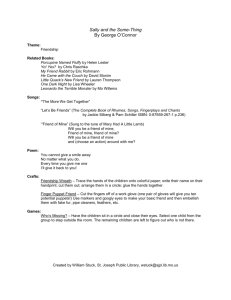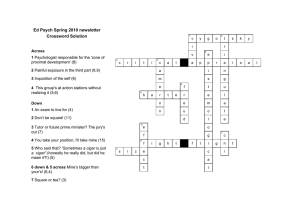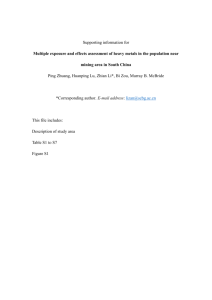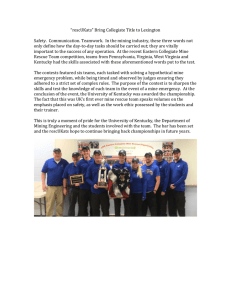Jordan Case Study: From Military to Civilian NGO-led mine action
advertisement
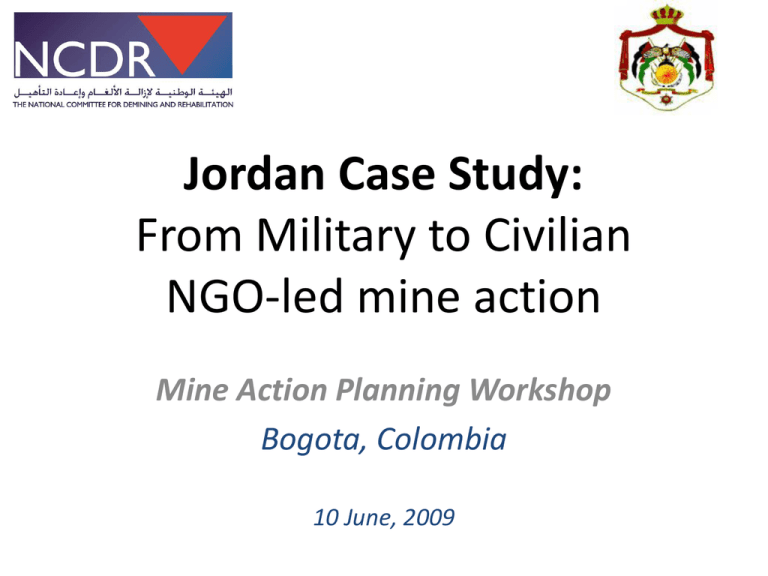
Jordan Case Study: From Military to Civilian NGO-led mine action Mine Action Planning Workshop Bogota, Colombia 10 June, 2009 • Mine Action Partners, in a spirit of cooperation, agree to carry out a mine action program; and contribute to it by combining resources, knowledge or activities; and share its achievements or failures. • H.M. King Hussein bin Talal tasked JAF with mine clearance in 1993 • 1 year before peace treaty with Israel • 4 years before AP Mine Ban Convention • Military-led Mine Action • Humanitarian demining aim • Limited resources (Funds, Machinery, Equipment, PPE …) • No capacity development • No access to international advancements in mine clearance • Limited support from International Community • Productivity slow • Article 5 Mine Clearance Deadline Approaching • National Program • Local Ownership • Clear & Committed Leadership • Establish NCDR as National Mine Action Center (NMAC) • NCDR Law No. (34) Overall Management Planning & Coordinating Supervising & Liaising Government Support - Under Prime Minister’s Office Focal Point for International and Domestic Stakeholders Working Relationship with Key Line Ministries: (Foreign Affairs, Planning, International Cooperation, Finance, Defense) Communication Involvement in planning Coordination in clearance activities Regular updates to REC Chief of Staff Support work of REC: resources, equipment, training Hire former REC officers Quality Assurance/ Quality Control Role Tasked with North Shuna Mine Clearance Project North Shuna Mine Clearance Project: • Retained Demining Role • Guidance and Supervision from NCDR • International & National Mine Action Standards • Increased credibility • Safer working environment • Increased resources through NCDR • Building trust • Completed ahead of schedule and under budget • • • • Determination Ownership Leadership Vision • Confidence • Momentum • Success! • Gov’t of Jordan • International Partners • Local NGOs • Military • Financial • Political Capacity Development Objective: • To develop key policy and strategic planning instruments that were limiting mine action's partnership base. • Identify Mine Action as development and humanitarian issue not engineering issue • Broad partnership base needed Ministry of Planning and International Cooperation UNDP Lobbying Explaining Mine Action Bigger Issues: More than demining Address the pillars of Mine Action to reduce poverty and suffering: SVA MRE Universalization • First time for integrated national plan • Broader development and international legal obligations • Mine Ban Convention • Mine Action was clear for potential donors Expanded International partners base Mobilized funds doubled in 2 years Greater domestic support from Government and Civil Society as a result • UN Agencies: UNDP, UNICEF • Geneva International Centre for Humanitarian Demining (GICHD) • Implementation Support Unit (ISU) • James Madison University (JMU) • ICRC • • • • Norwegian People’s Aid Royal Engineering Corps Mines Advisory Group Other countries’ Militaries (Belgium, Canada, Switzerland, France…) • Centre for Disease Control (CDC) • Cranfield University • Survivor Corps • Royal Medical Services • Jordan Red Crescent Society • Hashemite Commission for Disabled Soldiers • Higher Council for the Affairs of Persons with Disabilities • Lifeline for Consultancy and Rehabilitation • Strong local leadership • Political will • Bureaucratic Support • Clear vision and robust coordination • Transparency
